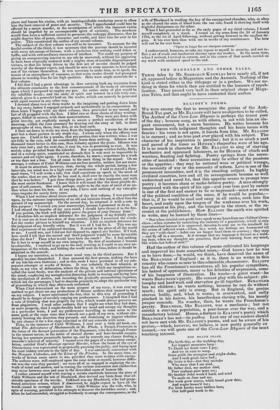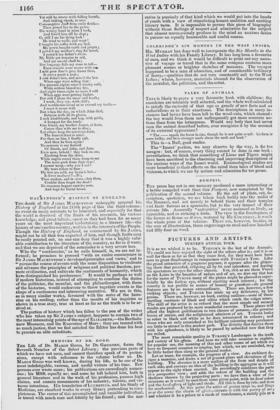ELLIOTT'S POEMS.
WE were among the first to recognize the genius of the AntiBread-Tax poet, as Mr. ELLIOTT will have no objection to be called.. The Author of the Corn-Law Rhymes is perhaps the truest poet of the day ; because song, as with others, is not with him an elegant amusement, but a stern business. He writes because his bosom heaves with indignant thoughts and his brain teems with fancies : his verse is not spun, it bursts from him. Mr. ELLIOTT is in earnest ; and no true poet ever played with his subject. The character of his inspiration is peculiar; but it is as much a part and parcel of the times as HOMER'S rhapsodies were of his age.. It is as much in character for Mr. ELLIOTT to sing of starving mechanics and oppressed labourers, as for HOMER of chiefs and: warriors, feasting and fighting. Poetry springs from the necessities of mankind : these necessities may be either of the passions or the appetites : they may be national woes or political wrongs,. the necessity of war or the necessity of reform. Love is one of the permanent necessities, and it is the standing subject. In highly civilized countries, love and all its arrangements become so well understood and cared for, that this appetite ceases to prompt true poetry ; it becomes sham or make-believe poetry. A man strongly impressed with the spirit of his age—and your true poet by nature is one of the first and easiest to be so impressed—must now write of the political condition of the mass, if he woula be popular,— that is, if he would be read and sung in all ranks, sunk into the heart, and ready upon the tongue of the workman over his work, the peasant at his play, and the lounger in the street, or the recreant at the publichouse. How ELLIOTT the smith was spirited to write, may be learned by these lines— "But when suicidal anti-profit laws speak to my heart from my children's:trenchers—when statutes for restricting the industry of a population, which is only superabundant because it is oppressed, threaten to send sue to the treadmill for the crime of inflicted want—when, in a word, my feelings are hammered till they are "cold-short"—habit can no longer bend thesis to courtesy ; they snap —and fly off in a sarcasm. Is it strange that my language is fervent as a weld.ing heat, when my thoughts are passions, that rush burning from my mind, like white-hot bolts of steel?"
Had the author of this volume of poems cultivated his language and improved his taste somewhat more,—God knows how he was so to have done,—he would, we think, have deserved the name of the BERANGER of England : as it is, there is no writer in this country who comes so near to this admirablechansonnier. ELLIOTT has all the Frenchman's earnestness, all his popular sympathies, his hatred of oppression, many o.L his felicities of expression, some of his happiness of illustration. He wants—a great want—he wants BERANGER'S gayety. He cannot play with his subject: p.hilosophy and hard work and starvation go ill together. BERANGER has no children ; he wants nothing, because he can do without much; his spirit only is stung. But in England, the genius starves bodily, and, what is worse, is overworked, and sadly pinched in his bairns, his heartbroken slaving wife, his moody pauper comrade. No wonder, then, he wants the Frenchman's. gayety. BERANGER, like ELLIOTT, was a mechanic ; but not amidst a starving population, a poor-house over the way, and a manufactory behind. Hence, a feature in ELLIOTT'S poetry which BERANGER'S has not—its pathos. Lest any of our readers should not have met with Mr. ELLIOTT'S poems, and not be aware of his genius,—which, however, we believe, is now pretty generally es teemed,—we will quote one of the Corn-Law Rhymes of the most touching interest.
THE DEATH FEAST.
The birth-day, or the wedding-day, Let happier mourners keep : To Death my festal vows I pay, And try in vain to weep. Some grief's the strongest soul might shake, And I such griefs have had; My brain is hot—but they mistake Who deem that I am mad.
My father died, my mother died, Four orphans poor were we; My brother John work'd hard, and tried To smile on Jane and me.
But work grew scarce, while bread grew dear, And wages lessen'd too ; For Irish hordes were bidders here, Our half-paid work to do. Yet still be strove with failing breath, And sinking cheek, to save
Consumptive Jaul from early death—
Then joined her in the grave. His watery hand in mine I took,
And kiss'd him till be slept; 0, still I see his dying look
He tried to smile, and wept !
I bought his coffin with My bed,
My gown bought earth and prayer ; I pawn't1 my mother's ring for bread, I pawn'd my father's chair.
My Bible yet remains to sell,
And yet unsold shall be; But language fails my woes to tell—
Even crumbs were scarce with II*.
I sold poor Jane's grey linnet then, It cost a groat a year ; I sold John's hen, and miss'il the hen
'When eggs were selling dear : For autumn nights seem'd wintry cold, While seldom blazed my fire, And eight times eight no more I sold When eggs were getting higher.
But still I glean the moor and heath; I wash, they say, with skill ;
And workhouse-bread ne'er crossed my teeth,— I trust it never will.
But when the day, on which John died, Returns with all its gloom,
I seek kind friends, and beg, with pride,
A banquet for the tomb. One friend, my brother James, at least, Comes then with me to dine ; Let others keep the marriage-feast, The funeral-feast is mine.
For then on him I fondly call,
And then he lives again! To-morrow is our festival Of Death, and John, and Jane.
Even now, behold ! they look on me, Exulting from the skies, While angels round them weep to see The tears gush from their eyes !
I cannot weep—why can I nut ?
My tears refuse to flow :
My feet are cold, my brain is hot—
Is fever madness 7—Nr.
Thou smilest, and in scorn—but thou, Couldst thou forget the dead ? No common beggar curtsies now, And begs for burial bread.



























 Previous page
Previous page